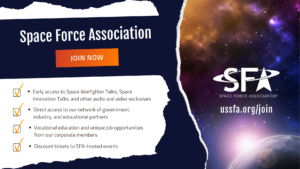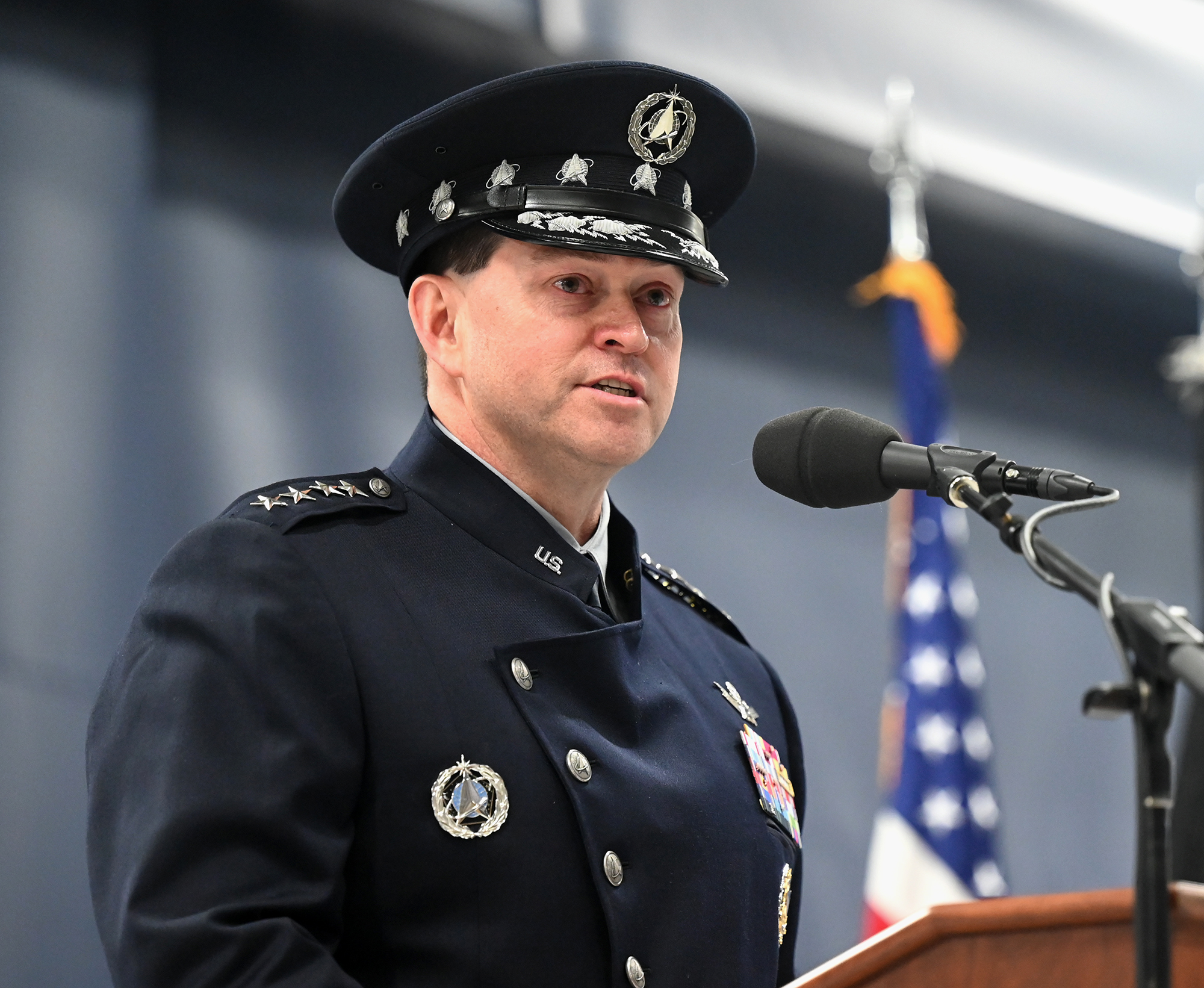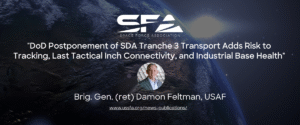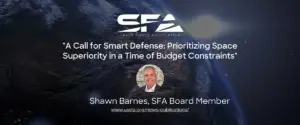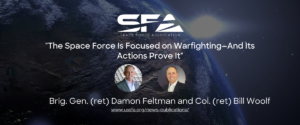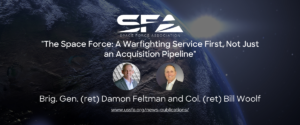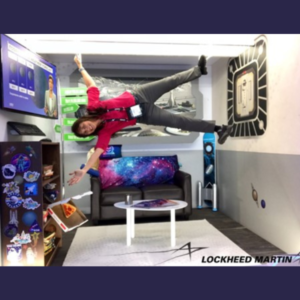By Bill Woolf, President and Founder, Space Force Association
It was a cool day in D.C. on December 20th, 2023. This date marks the third birthday of the United States Space Force. General B. Chance Saltzman, Chief of Space Operations, invited SFA to sit down and discuss his priorities and other important initiatives before the Birthday Celebration Dinner, hosted by the SFA D.C. Chapter at the Army/Navy Country Club in Arlington. As always, the Saltzman home was decorated with no less than thirty Christmas trees because Jennifer Saltzman, CSO Spouse, feels it is important to celebrate every holiday to the fullest. Something she likes to joke about regularly as packing and moving the quantities of ornaments and decorations around for the last twenty-six years has always been interesting. Luckily the Saltzman’s have plenty of room at their new residence.
Being able to sit down with the new CSO is a tremendous honor. I’ve been privileged to know the Saltzman’s since our first duty assignment at Malmstrom AFB back in the mid 1990’s. To sit down with Gen Saltzman in his new role and get his perspective on how he will continue the great work accomplished by Gen Raymond, the first CSO, was a true gift. The importance of telling the USSF story continues to be at the heart of why SFA exists, so it was refreshing to hear Gen Saltzman talk about the time he was on the Joint Space Operations Center (JSpOC) floor on 11 January 2007 when the Chinese conducted an anti-satellite missile test which fundamentally changed the way the space domain was viewed. It changed from a benign environment to a warfighting domain. No different than any of our other warfighting domains of land, maritime, air and cyberspace. “I just remember vividly the feeling that this is a pivot point in the space community in space operations. And that we’re going to have to look differently about how we operate in space from that day on”, Gen Saltzman said about the event. He goes on to say about the standup of the USSF, “Until finally we realized, the threats are bad enough, our dependencies on space are strong enough, that we’re going to have to focus differently, and it made sense to build the service. And now the United States Space Force is focused on those threats”.
Gen Saltzman mentioned critical lessons being learned about the importance of the space superiority mission using Ukraine as an example. He stated, “What we’re observing is the criticality of space in modern warfare. And you can look at a number of different lenses, the ability to deny single satellite capabilities became very obvious. The ability to cyber-attack ground networks that facilitate space capabilities became very obvious…and then the commercial augmentation of space capabilities showed its merits”.
“The side that practices the best, will have an advantage early in the conflict. And so that’s what I want to do is make sure we have the skills and the experience on day one of the conflict.”
– Gen Saltzman
As a retired space operator, I had always struggled with understanding how the feedback loop worked from operations through acquisition to ensure the right capabilities are being delivered to Guardians. When asked about the testing, tactics and training process, he outlined a process to ensure operators are connected with the right concepts to accomplish their space superiority mission. Then he spoke about the importance of testing those concepts to build out the tactics, techniques and procedures manuals the operators will use to allow freedom of action in the space domain, while denying the same freedom to a potential adversary. Gen Saltzman said, “You take the operational concept, and you start to look at the systems you have and then build the tactics, techniques and procedures the operators will need to employ.” He uses the example of moving satellite communications beams to better support the terrestrial domains. He also mentioned the need to “Detect a rendezvous proximity operation an adversary is trying to do in real time” and then “practice it on a range where you can control all the inputs”. As a Space Aggressor it was great to hear him speak about the need for an opposition force, aggressors, to help train operators on how to respond to threats in the space domain. On a side note, SFA had the opportunity to sit down with Col Kyle Pumroy, Commander, Delta 11 (Range and Aggressor Mission) to get his perspective on how to implement the concepts Gen Saltzman spoke about.
When asked about Space Force presentation of forces, Gen Saltzman spoke about the “legal responsibility to provide forces to all combatant commands” as the combatant commander with the unified command plan (UCP) responsibility to provide space superiority services to the joint force. He went on to explain the need to have ready trained experts at the regional combatant command levels to provide space superiority services. Several Space Force Service Components have been established to support European Command, Indo-PACOM, Special Operations Command and Central Command. Gen Saltzman spoke about the need to speed decision making by forward deploying space expertise to each of the geographic combatant commands to “win the decision cycle” by pushing “decisions into the regions”.
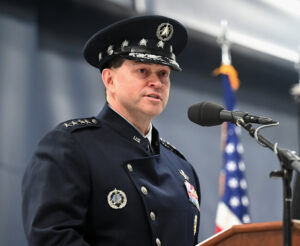
In terms of professional development, Gen Saltzman has a clear vision on how best to recruit and retain the most skilled Guardians. He spoke about the partnership with Johns Hopkins to provide both intermediate and senior developmental education for the Space Force as an innovative approach to doing business because “it’s not your traditional War College” and “there’s going to be a lot of other services who will want to send their people to our war colleges”.
Gen Saltzman provided his priorities for the Space Force to include resilient ready combat credible forces, amplifying the Guardian Spirit and continuing to foster strategic partnership both with partner and allied countries and with industry. When defining what a resilient force looks like he states, “Technology is not enough. We’re going to invest in the training, the experience, the testing, ‘to’ validate operational concepts” and “when we do that, we’re going to give pause to any nation that thinks they can cause us harm in space”. Amplifying the Guardian Spirit refers to resources and empowerment. Gen Saltzman mentions the need to “give them the resources, empower them to run with their ideas”. He then discussed the importance of putting the structures in place to take care of them and have opportunities that overshadow the “inconveniences of military life”. Finally, he spoke about the importance of partnerships with other services, combatant commands, allies and international partners “based on mutual trust, mutual benefit” that “is not transactional”. In order to accomplish this, the CSO plans to “have the right kind of activities to make sure we get the right kind of partnerships”.
“Technology is not enough. We’re going to invest in the training, the experience, the testing, ‘to’ validate operational concepts” and “when we do that, we’re going to give pause to any nation that thinks they can cause us harm in space.”
-Gen Saltzman speaking on his priorities for the Space Force
General Saltzman has a clear vision of how he will continue the great work accomplished by Gen Raymond. If you are privileged enough to be part of the Space Force as an active-duty member, civilian, Guardsman, Reservist or contractor, your CSO is looking for each of you to be emboldened to continue evolving the new service. If you are unable to join the Space Force, you can still join the Space Force Association, the only non-profit organization solely dedicated to the United States Space Force Guardians and their families. Space is a domain that will require assistance from each of the sectors to ensure freedom of action for the U.S., partners and allies. While Jennifer is packing away Christmas decorations, the Space Force is ready to execute its mission of organizing, training and equipping Guardians to conduct global space operations with Gen Saltzman as the CSO.
